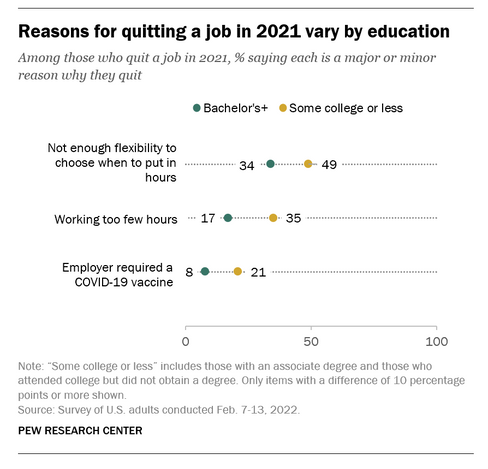The great resignation
- Peter Lorenzi

- May 6, 2022
- 2 min read
May 6, 2022. Majority of workers who quit a job in 2021 cite low pay, no opportunities for advancement, feeling disrespected. Full article below, followed by some key survey results from the report.
My gut reaction was to consider the ability or option to leave as more important than the desire to leave. Those who just gave up and those who went on to (much) better (paying) jobs have markedly different motivations for leaving their current employer; that option does not seem to be considered in this study, although the evidence is that those under age thirty quit at a much higher rate than did those over 65. This 'fact' can also be interpreted as an excess of expectations and entitlements from recent college graduates, accelerated by Biden's "freezing" of college loan re-payments.
Some wags claim the problem is a decline in immigration (see article, below), this, just as immigration continues to surge, seems ludicrous on the surface. The problem is the nature of the immigrant's skills and their readiness for the digital labor force, not just for low-wage service jobs "That Americans won't do." Analyses such as these "won't do" in identifying and solving the employment problem. That problem used to be "high" unemployment, while today's problem is low workforce participation. To try to replace the non-workers with immigrant labor is an expensive, unsustainable solution, as the immigrants often lack skills, take low-wage jobs, pay little in taxes and add familial burdens to the economy while not generating sufficient taxes or other resources to take care of those ten million people they are replacing. While "big business" (along with the Catholic Church and the Democrat party, i.e., filling pews and expanding subsidy-seeking voters) loves abundant, inexpensive, servile immigrant labor, it also generates a downward wage spiral.
The most noticeable problem, discussed earlier here, is the cavernous gap between job openings and those exiting the labor force. Even a "healthy" market for new college grads (article linked below graphic) will not compensate for the departure from job seeking that has increased steadily for the past few years, outside the pandemic spike (see graphic, below). That five-percentage point decline this century represents eight to ten million Americans who choose not to -- or claim to be unable to -- work, including a several million person increase in disability claims in that period.

Healthy market or not, college grads with poor digital, analytical and communication skills are likely to find themselves facing wages insufficient to pay off their college debt.








Comments